Divine Liturgy in the monastery of Saint Mary Magdalene in Star Dojran ( 26.04.2009 )
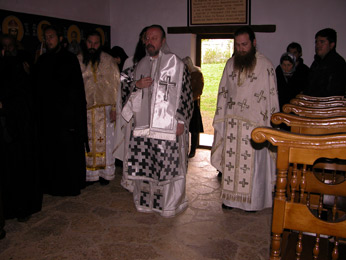
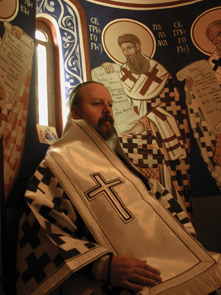
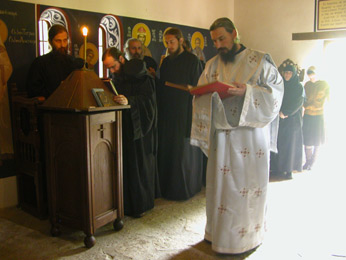
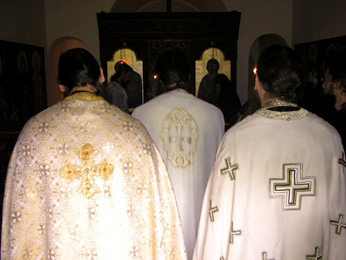
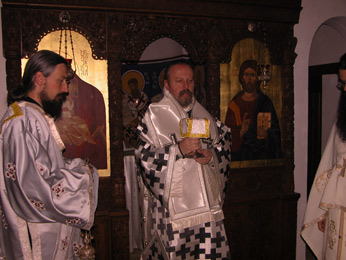
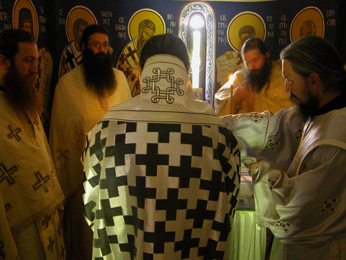
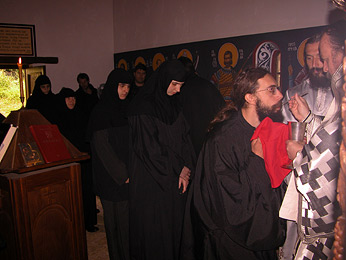
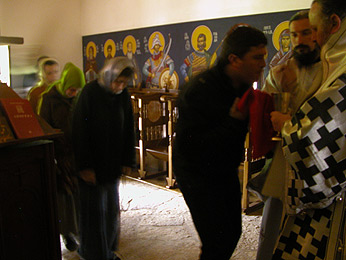
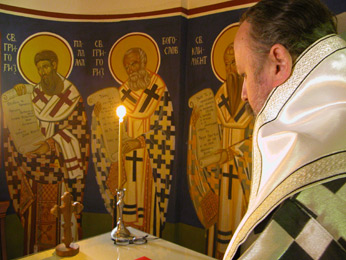
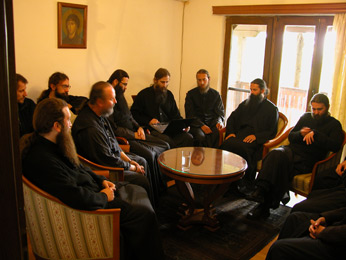
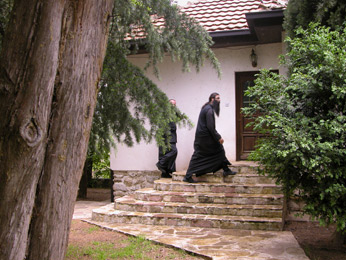
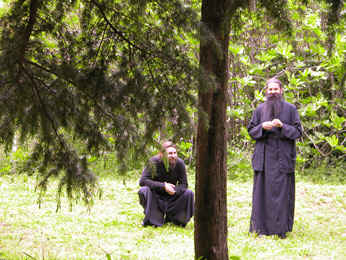
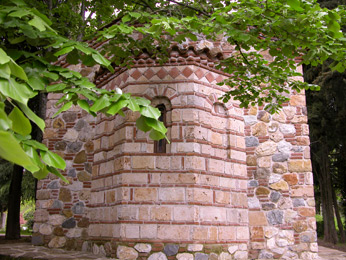
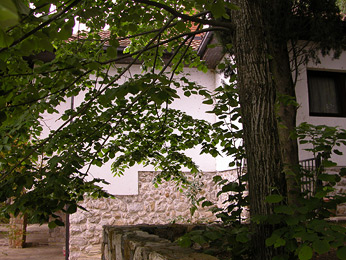
Children, compunction and theological admiration is what we always experience from the thought that the hearts of the Apostles had burnt inside already while the Risen Christ had talked to them on the road, yet their eyes opened only when the bread was broken. The Lord clearly indicates to us the Holy Mystery of Eucharist (or Liturgy) i.e. the Church as the sole place, also time, and communion of the gift of beholding of God and knowledge of God. Therefore, I feel the need this time to focus some more on the relation between our heart and the Holy Eucharist, so that we grasp clearer from where and how flares up the fire in the heart.
Person and communion i.e. the personal relationship with God and personal relationships with our fellowmen in Him are the common content and ontological link between the heart and the Holy Eucharist. More precisely, in the all-embracing Mystery of the Church our heart becomes the personal spiritual center of our being both in the ascetical-hesychastic and in the liturgical-catholic sense.
We know from the Holy Fathers’ teaching that the Lord Jesus Christ from the moment of Holy Baptism through the grace of the Holy Spirit occupies the center of our heart. However, what does in fact mean that the heart is the personal spiritual center in the ascetical-hesychastic sense? You are certainly familiar with one of the, at least for me, most powerful points in the Holy Gospel: “Foxes have holes and birds of the air have nests, but the Son of Man has nowhere to lay His head” (Luke 9:58). With these words, for us to the core reproachful and current, the Godman Christ confirms us that man’s heart, as the spiritual center, is the sole place of personal meeting of God and man. That only in the purified, illumined, and deified heart does the Lord find His peace and resting place. That quite few ascetics in a generation attain to the gift of deification, of unceasing mind-and-heart prayer, and of beholding of divine uncreated light.
Now, what does it mean, that the heart is the personal spiritual center also in the liturgical-catholic sense? The communion and unity that we, Orthodox Christians, establish through the Holy Eucharist, communing of Christ God and, in Him, with one another, is a unity, deeply ontological and graceful, which frees man from the limits of time and space. So that, every member of the Church lives, loves, and is saved with the help of all the members of the Church, the earthly and the heavenly ones. Each one of us lives gracefully and prayerfully in all and for all, and all live in everyone and for everyone. This is the catholic life of the Church, made possible by the grace of the Lord Holy Spirit. At that, the life of everyone is his own life and the person of everyone is his own person, by the image and likeness of the unity and the personal communion of our God the Holy Trinity.
We live in Christ, in His heart, and Christ lives in us, in our heart. Therefore does the mystery of our previously described mutual intertwining and interpenetration happen in our heart. And therefore is the Godman Christ the center of our center i.e. the center of our heart and of our life and existence. He is the center of our personal being and of our rationality (logosness), as the Word (Logos) of our Creator, through Whom all came into being; He is the center of our personal well-being, as the Son of God, Who fulfilled the entire Dispensation of Salvation of our Heavenly Father; and He is the center of our personal eternal well-being in the infinite Kingdom and Communion of the Father and of the Son and of the Holy Spirit. Yet, this mystery will be revealed to them who will purify their hearts. “Blessed are the pure in heart, for they shall see God” (Matthew 5:8).
All the other points in the liturgical text, for instance by Saint John Chrysostom, where the heart is directly or indirectly mentioned, only confirm the ascetical-hesychastic and liturgical-catholic meaning of man’s heart. And all these points can be grasped and interpreted correctly only from these two aspects:
“Illumine our hearts, O Master, Lover of mankind, with the pure light of Your divine knowledge.”
“Look down on me, a sinner, Your unprofitable servant, and cleanse my soul and my heart from an evil conscience; and by the power of the Holy Spirit enable me, who am endowed with the grace of the priesthood, to stand before this, Your Holy Altar, and perform the sacred mystery of Your holy and pure Body and precious Blood.”
“O Lord God Almighty, Who alone are holy, You accept the sacrifice of praise from those who call upon You with their whole heart. Accept also the prayer of us sinners, and lead us to Your Holy Altar. Enable us to offer you gifts and spiritual sacrifices for our sins and for the errors of the people.”
“Let our hearts be on high.”
“And grant that with one mouth and one heart we may glorify and praise Your all-honorable and majestic Name of the Father and of the Son and of the Holy Spirit, now and ever and unto ages of ages.”
“Christ, our God, the fulfillment of the Law and the Prophets, You have fulfilled all the Father’s salvific Dispensation. Fill [equally as much] our hearts with joy and gladness, always, now and forever, and to the ages of ages. Amen!”
Children, do you notice what we lack, in the sequence of the previously quoted prayers just as in their completeness and in their interpretation, so that we grasp clearer both the ascetical-hesychastic and the liturgical-catholic aspects of our heart as the personal spiritual center of our being? What we lack is explanation of the relation between the Holy Mystery of Priesthood and the mind-and-heart liturgical prayer.
I have talked to you many times that the offering of the gifts at the altar (the Holy Table) of the temple—that is, the standing of the priest in body before the altar—inwardly spiritually corresponds with the standing of the mind before the altar of the heart—that is, with the mind-and-heart prayer and the rational sacrifice of man’s person that is offered and consecrated to God in the heart. Unless the priest stands with his mind before the throne of God in his heart, what use if he stands with his body before the throne of God in the temple? Therefore, after the Great Entrance, when we offer the Precious Gifts at the Holy Table, the second prayer that we say after the first one is the following: “Do good to
You may guess yourselves that all the corresponding prayers during the Holy Liturgy, they who are bearers of God’s gift of the mind-and-heart prayer say in their heart. Therefore when I recall the prayer—“It is fitting and right to sing to You, to bless You, to praise You, to give thanks to You, and to worship You in every place of Your dominion”—I ask myself what an absurd it is for us monastics to dedicate our life to God and to worship Christ everywhere and at any time, while where it is precisely most important to do that—in our hearts—to have no access yet.
Here we come back again to our painful subject about our heart defiled, closed, and enslaved by passions, as a place where the Son of Man has nowhere to “lay His head”. Since our mind cannot enter the closed heart and reach the Son of Man, He stays there alone, hungry, thirsty, a stranger, unclothed, imprisoned… for our love, for us, and for our salvation. Therefore, so that we reach Christ and serve Him, we will recall again that first we should sufficiently purify our heart from passions, come to know the ‘place of the heart’, discover the entry of the
After all we have heard, my children, at least three things theoretically become clearer to us:
First, we understand clearer that the road to God, as well as to the heart of our fellowman, passes only through our purified heart.
Second, we understand clearer how our Fathers and Teachers managed to maintain and flare up the spiritual fire in their heart—while they prayed in the solitude of their cell unceasingly united with their Lord, while they suffered in their prayer for all people, while they prayed and served Liturgy for the life of the world, while they were paid back with evil by them for whose well-being and salvation they prayed and whose determined time for repentance they prolonged. They knew that if only once they responded with evil for the evil, also if only one man stayed out of their prayer, the fire within them would be smothered and extinguished.
Third, we also understand clearer the words of our Lord and Savior, the Godman Jesus Christ, “I came to send fire on the earth, and how I wish it were already kindled!” (Luke 12:49).
Metropolitan Nahum of Strumica